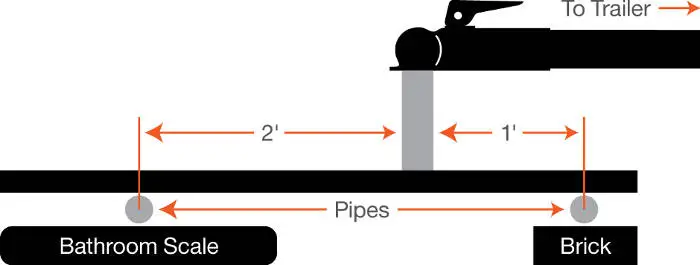How to Measure Tongue Weight


Measuring the Tongue Weight of Your Trailer
There are a few different methods that can be used as a trailer tongue weight calculator, including using a tongue weight scale, using a bathroom scale or using a vehicle scale.
This guide walks through the methods for how to calculate tongue weight. It covers three different options, depending on the equipment available to you.
What is Tongue Weight?
Tongue weight (TW) is the downward force exerted at a vehicle-trailer coupling point when your trailer is hooked up for towing. The tongue weight should be about 10-15% of the gross trailer weight.


How to Determine Tongue Weight
A. Measuring with a Tongue Weight Scale
Available at most towing supply shops, a tongue weight scale is a small scale designed specifically to measure a trailer's tongue weight.
How do you use a tongue weight scale?
To use a tongue weight scale, simply place the scale under the trailer jack and take a reading. If the jack is not a good fit, a sturdy pipe may be used, placed vertically between the coupler and scale.


B. Measuring with a Bathroom Scale
An alternative method for measuring tongue weight is to use a common bathroom scale. If the tongue weight is expected to be less than 300 pounds, simply place the tongue or jack directly on the scale. You may wish to protect the finish of the scale by placing a small piece of plywood down first.
If the weight is likely greater than 300 pounds, you can use some boards and pipes to set up a test as shown in the diagram. Using this setup, take a reading off the bathroom scale and triple it to find your actual tongue weight.


- Park on a level surface.
To begin, make sure your trailer is parked on level ground and the wheels are chocked. - Lay a 2x4 stud on the ground.
Position a 2x4 or other sturdy board on the ground, directly below the trailer tongue. The board must be at least 3-1/2 feet long. - Position a bathroom scale at one end and a block at the other.
Place the bathroom scale roughly 2 feet from the trailer tongue, and a block or brick about 1 foot from the trailer tongue. Protect the bathroom scale with a small piece of plywood on top. - Center the stud on two pipes.
Insert two horizontal pipes -- one in the center of the bathroom scale and one in the center of the block.
Measure the distance from the trailer tongue. Make sure the pipe on the scale is 2 feet from the center of the tongue, and the pipe on the block is 1 foot from the tongue. - Rest the trailer tongue on a vertical pipe.
Position a pipe vertically under the trailer tongue, and lower the trailer jack until the coupler is fully resting on the pipe. - Read the scale and multiple by 3.
Take an initial reading from the scale bathroom scale, and multiple it by 3. This is the tongue weight.
(Bathroom scale reading) x 3 = (tongue weight)
C. Measuring with a Vehicle Scale
One last method for measuring the tongue weight of your trailer is to use a vehicle scale at a rest stop or at your local dump.
Begin by weighing your vehicle without the trailer hooked up. Then, hook up your trailer and weigh your vehicle again, without letting the wheels of the trailer touch the scale. Take the weight of your vehicle by itself and subtract it from the weight of your vehicle with the trailer attached. The difference is the tongue weight of the trailer.


Couple Your Trailer Stress-free!
Hooking up your trailer can be stressful when you have to wrestle the coupler latch into place. So, QuickPin™ doesn't have a latch!
This revolutionary trailer coupler hooks up with a single pin for painless, stress-free coupling every time. No complicated hinging components and no headaches!
FAQs
Why is tongue weight important when towing?
Tongue weight is important for towing because improper tongue weight can cause driving hazards. If the tongue weight is too little -- less than 10% of the total trailer weight -- the trailer may tend to sway back and forth. If the tongue weight it too much -- greater than 15% -- your vehicle may become less responsive, especially when turning and braking.
Properly loading your trailer -- placing cargo in front of or behind the axle -- can have a major effect on tongue weight.
How do you measure tongue weight on a trailer?
To measure tongue weight on a trailer, you can use a tongue weight scale, a common bathroom scale or a vehicle scale. Place the tongue of the trailer on the scale, using the trailer jack or propping it up with a pipe.
What is tongue load?
Tongue load is the weight of a trailer at its tongue or coupling point. Typically, tongue load or tongue weight is 10 to 15 percent of the total weight of the trailer.
How do you weigh an RV tongue weight?
To weigh RV tongue weight, place the tongue of the trailer on a tongue weight scale. The TW can also be found by weighing your tow vehicle on a vehicle scale by itself and comparing it to the vehicle weight when the trailer is coupled.
RVs are typically heavy trailers, so the scale must be heavy-duty enough to handle the weight.
Can too much tongue weight cause trailer sway?
Too much tongue weight can cause trailer sway, but it primarily causes reduced control for the driver over the vehicle.
What should tongue weight be?
Tongue weight should be about 10% to 15% of the total weight of the trailer or gross trailer weight. Too much tongue weight can impair driver control over the vehicle, and too little can lead to sway in the trailer.
What happens if tongue weight is too heavy?
If tongue weight is too heavy, it can make your vehicle more difficult to control, especially when making turns and braking. If tongue weight is too light, it may cause the trailer to sway while driving.
 ARIES
ARIES  CURT
CURT  LUVERNE
LUVERNE  UWS
UWS 




